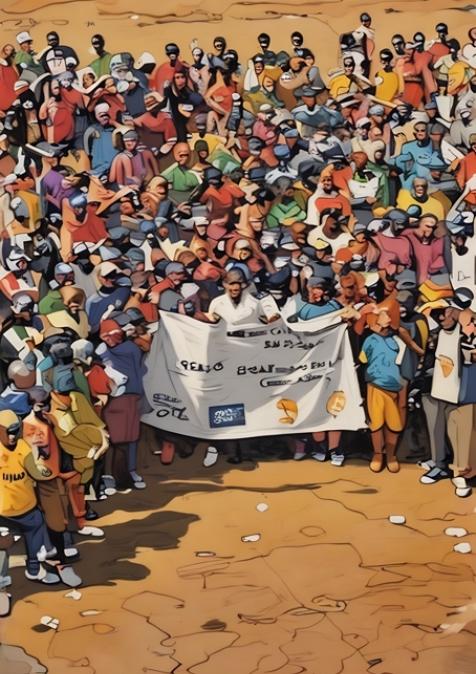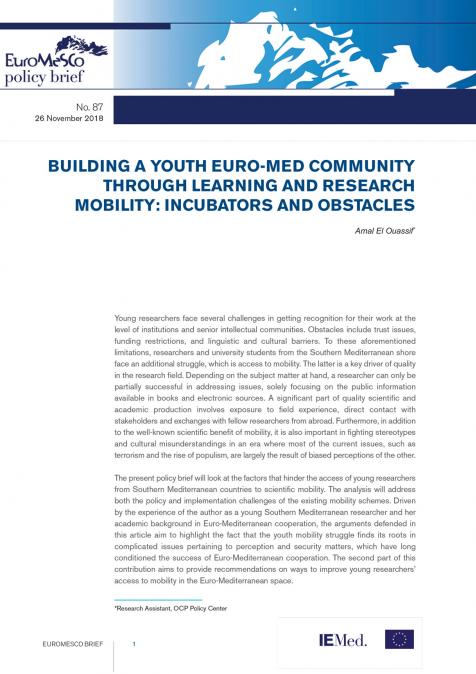Publications /
Opinion
The author of this opinion, Othman Mezouar, is a 2023 alumnus of the Atlantic Dialogues Emerging Leaders Program.
April 6 each year marks the International Day of Sport for Development and Peace, a day dedicated to recognizing the potential of sport as a driver of social change and foundation for building a more inclusive world. Having spent several years working at the intersection of sport, youth empowerment, and international development, I have witnessed firsthand how sport can be an extraordinary tool to educate, engage, and uplift young people—especially in vulnerable communities across sub-Saharan Africa.
My experience of leading and implementing sport-for-development initiatives in Burkina Faso, Ivory Coast, Kenya, Mali, and Senegal has taught me that well-designed sports programs can extend beyond the playing field, serving as catalysts for education, health, gender equality, and social cohesion. Sport is more than just a game: it is a pathway to opportunity, inclusion, and sustainable social change.
Sport as a Catalyst for Education
Sport has a unique power to enhance education and skills development, making learning more engaging and accessible—especially for children facing economic hardship, social discrimination, or uninspiring curricula. Traditional classroom settings often struggle to reach all students, but by integrating play-based learning and experiential education, sport can transform the learning experience and improve outcomes for marginalized young people.
During my time at Right To Play International, we harnessed play-based methodologies to promote equitable and inclusive literacy and life skills for 37,000 children aged 6-12 in Gao and Mopti, Mali. The children came from host and internally displaced communities spread across 60 primary schools and 20 accelerated learning centers. Beyond education, these approaches also played a vital role in improving the living conditions of more than 5,000 children, and combating child labor in artisanal and gold mining communities, in the circle of Kenieba, Mali.
“Sport has the power to change the world. It has the power to inspire. It has the power to unite people in a way that little else does. It speaks to youth in a language they understand. Sport can create hope where once there was only despair.” - Nelson Mandela
A key driver of this success was the concept of ‘edutainment’—a blend of education and entertainment—which proved particularly effective in engaging young learners. By making learning interactive and enjoyable, we helped to reduce dropout rates and to improve long-term educational outcomes, ensuring that children remained motivated and invested in their own development.
Through structured play-based sessions, children developed essential life skills, including goal-setting, communication, problem-solving, and leadership. These skills not only enhanced their academic performance, but also strengthened their future employability, equipping them with the tools to navigate challenges and seize new opportunities.
Sport as a Vehicle for Gender Equality
Empowering young girls through sport is one of the most significant ways to drive sustainable social change. In many parts of the world, girls are still denied opportunities to participate in sports because of cultural norms, safety concerns, or lack of resources. However, well-structured programs can challenge these barriers, providing safe spaces for young girls to develop confidence, leadership, and resilience.
While working in West and East Africa, I witnessed how sports programs, when designed in line with gender-sensitive approaches, can shift mindsets and open up new opportunities for young girls. For example, in Tackle Africa’s projects, football was used as a platform to educate girls on reproductive health, gender-based violence, and women’s and girls’ rights—topics that are often stigmatized or ignored. The structured environment of a football field provided participants with a sense of security and freedom to express themselves, develop self-esteem, and push back against social norms that often limit their potential.
Beyond the field, sport also helps young girls gain access to leadership roles. Programs that train female coaches, referees, and mentors contribute to gender inclusivity in sports governance, showing young girls that they, too, can aspire to leadership roles both in sports and in their communities.
Sport for Peacebuilding and Social Inclusion
Sport has a unique ability to unite people across ethnic, religious, and socio-economic divides. In regions affected by conflict, poverty, or social exclusion, sport can foster tolerance, respect, and intercultural understanding.
I have witnessed firsthand how sport can be used to promote peacebuilding and social cohesion among young people affected by instability. Sport can definitely play a relevant role in fostering unity, breaking down social barriers, and promoting peace among young people. When young people from diverse backgrounds play together, they learn to collaborate, communicate, and resolve conflicts peacefully. Sport becomes a common language that transcends differences and encourages teamwork, respect, and mutual understanding. This is particularly important in post-conflict societies, where rebuilding trust among the young is essential for long-term peace and stability.
One core belief of mine is that true inclusion means involving young people who live with disabilities, and ensuring they too can participate fully in these activities, reinforcing the message that sport is for everyone.
Sport for Health and Wellbeing
Beyond its social benefits, sport plays a transformative role in enhancing both physical and mental wellbeing among young people. It not only helps prevent non-communicable diseases, improves mental health, and fosters a positive self-image, but also serves as a powerful vehicle for delivering critical health interventions to vulnerable communities.
Through the projects I have implemented, sport has proved to be an effective tool for raising awareness about pressing health issues. In regions where HIV/AIDS remains a major public health concern, I have worked on sport-based education programs that disseminate life-saving health information in culturally relevant and engaging ways.
One particularly powerful example is the integration of pitchside mobile health clinics within football sessions and tournaments. Football, as a universally loved sport, serves as a great mobilizer, bringing young people together in comfortable and familiar settings. By organizing voluntary HIV testing and counselling services on-site during football events, we have seen a significant increase in youth participation in health screenings and education. The pitchside setting reduces stigma and logistical barriers, making it easier for young players to access critical health services. Players could undergo HIV testing and receive counseling in a safe and supportive environment. Many young people, who would otherwise avoid visiting a health center, were more willing to be tested when surrounded by their teammates and coaches—people they trust. The presence of trained counselors also ensured that those who tested positive received immediate support and guidance. Moreover, peer encouragement within the teams played a crucial role in breaking down misconceptions about health issues, fostering an open dialogue, and empowering players to make informed decisions.
Beyond disease prevention, sport also provides psychosocial support for young people who have experienced trauma, displacement, or hardship. Organized leagues, peer-support groups, and coaching mentorship offer a sense of normality and emotional healing, making sport a crucial intervention for vulnerable youth. Whether through community-based tournaments or structured play sessions, sport creates a supportive network that helps young people build resilience, improve self-esteem, and take charge of their health and wellbeing.
From Grassroots to Global Impact: The Need for Sustainable Investment
While the impact of sport on youth empowerment is undeniable, it remains challenging to ensure that these initiatives are sustainable and scalable. Too often, sport-for-development programs are seen as short-term interventions rather than long-term solutions for systemic change.
To maximize impact, I suggest:
1. Stronger Policy Support: Governments must integrate sport into national education, health, and youth-development policies. Investment in school-based sports programs, coach education, and community sports infrastructure is essential.
2. Youth Leadership in Sport Development: Young people should not just be participants but also shapers of sport-development projects. Their voices, experiences, and insights are critical in creating effective programs.
3. Accessible and Inclusive Infrastructure For All: Providing safe spaces for girls and young people with disabilities to play, and breaking down barriers to sports participation, should be global priorities.
4. Cross-Sector Partnerships: The success of sport-based interventions relies heavily on strong collaboration between NGOs, international organizations, the private sector, and local communities. Strategic partnerships can help mobilize resources, share expertise, and amplify the impact of these initiatives. Private companies, for instance, can play important roles by integrating sport initiatives into their ESG (environmental, social, and governance) strategies, ensuring that support reaches young people at grassroots level. Moreover, the involvement of influential local and international sports figures—such as football superstars Sadio Mané and Serge Gnabry, whom I had the pleasure of meeting—can further enhance visibility, inspire young people, and drive positive social change.
Conclusion: On The Importance of Celebrating April 6
April 6 serves as a reminder of sport’s potential to empower, educate, and transform the lives of young people worldwide. However, the conversation must extend beyond just one day of recognition. Governments, NGOs, and private-sector stakeholders must work together to ensure that youth-focused sports programs are properly funded, well-structured, and deeply integrated into broader development strategies.
Through my experience of managing international sport-for-development initiatives, I have seen the undeniable impact that sport can have—not just in shaping the individual futures of young people, but also in fostering stronger, healthier, and more inclusive societies. Sport is more than just a game. It is an opportunity, a right, and a powerful force for positive change. As we reflect on April 6, we must commit to making that change a permanent reality for young people worldwide.







